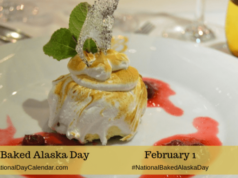
National Blueberry Muffin Day on July 11th gives us reason to get up in the morning and celebrate! American’s love their blueberry muffins so much, it’s their number 1 favorite muffin flavor. Whether it is for breakfast or a snack, blueberry muffins are melt-in-your-mouth delicious.
- It is hard to say how the blueberry muffin began, but one theory is by recipe adaptation. Europeans in their native countries used berries called bilberries in muffins, cakes and other baked goods. Upon arrival in North America however, they learned that bilberries were not available. Instead they found wild blueberries growing and plentiful. Native Americans already used these berries in their cooking. Some have concluded that European immigrants started using the wild blueberries in place of bilberries in their baking, including muffins.
- While enjoying a delicious blueberry muffin, consider the powerhouse the blueberry is. This once wild berry became domesticated during the early 1900s thanks to the observations of Elizabeth Coleman White and the research of Dr. Frederick V. Coville. Before their efforts, wild blueberries were never successfully transplanted and raised in any farming operation for personal or commercial production. The only way to enjoy fresh blueberries was to seek them out where they grew naturally.
- Today we can enjoy the abundant potassium, vitamin C and B6, and other health benefits of the blueberry much more readily than they did 120 years ago. We bake them into muffins and eat them by the handfuls. They’re so likable, blueberries celebrate a popsicle, cheesecake and a popover day, too! Don’t forget, July is National Blueberry Month.
- The blueberry muffin is the official muffin of Minnesota.
- If all the blueberries grown in North America in one year were spread out in a single layer, they would cover a four-lane highway that stretched from New York to Chicago.
- The blueberry is the second most popular berry in the US (the strawberry is number one).
- Blueberries contain anthocyanin, which is good for eyesight.
- Blueberries contain significant quantities of both antibacterial and antiviral compounds, and have a reputation in northern Europe of fighting infections. They may also help protect against heart disease.
- English muffins which are yeast raised and cooked on a griddle, may date back to the 10th or 11th century in Wales.
- American muffins are ‘quick breads’ made in individual molds. Quick breads were not developed until the end of the 18th century.
- The McDonald’s Egg McMuffin was introduced in 1972, it consists of American cheese, Canadian bacon, an English muffin and an egg.
- Do you know the Muffin Man? The Muffin Man, the Muffin Man. Do you know the Muffin Man, Who lives in Drury Lane? The muffin man went door to door delivering English muffins along Drury Lane. Many of the households on Drury Lane would have their food delivered to them. The rhyme was first published around 1820.
- Four U.S. states have adopted a State Muffin. (Massachusetts – Corn, Minnesota – Blueberry, New York – Apple and Washington – Blueberry).
- If all the blueberries grown in North America in one year were spread out in a single layer, they would cover a four-lane highway that stretched from New York to Chicago.
- The blueberry is the second most popular berry in the US (the strawberry is number one).
- The blueberry is the official state fruit of New Jersey.
- According to fatsecret.com, there are 385 calories in one large blueberry muffin.
Sources:












